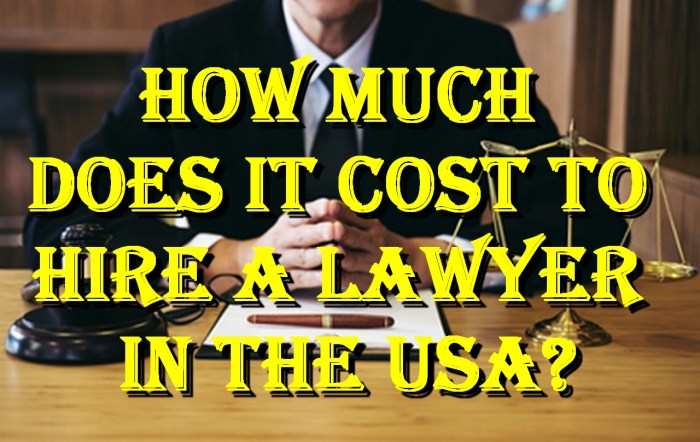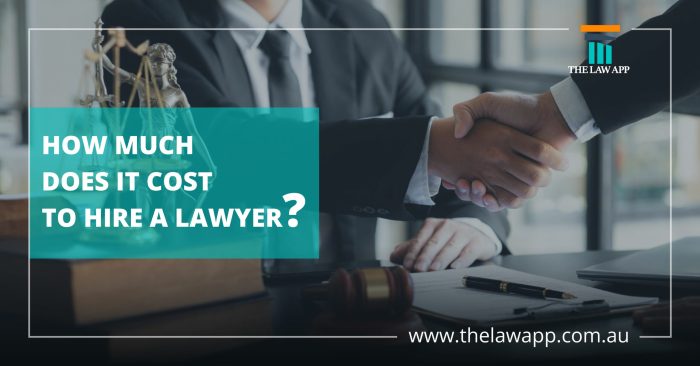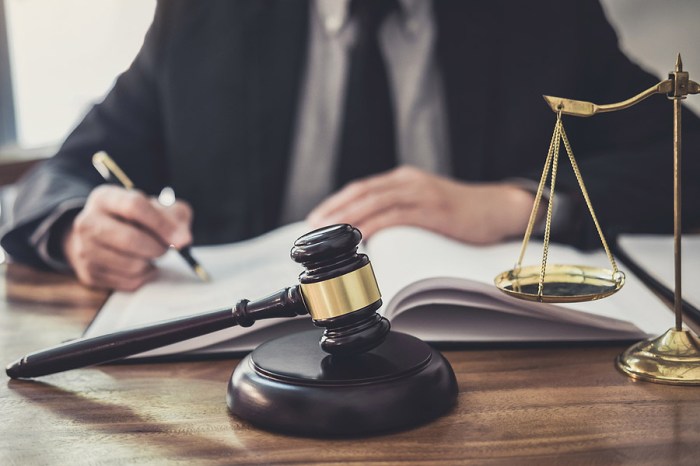What are the long-term costs of hiring a lawyer – When considering the legal complexities of various life events, understanding the long-term costs of hiring a lawyer is crucial. This comprehensive guide delves into the financial implications associated with legal representation, providing valuable insights to empower individuals in making informed decisions.
We will explore different billing models, hidden costs, and strategies for mitigating expenses, ensuring that you navigate the legal landscape with confidence and clarity.
The journey of hiring a lawyer involves more than just the initial consultation fees. It’s a commitment that can have long-term financial implications, impacting your present and future financial well-being. This guide will provide a roadmap to help you anticipate and manage these costs effectively.
Retainer Fees
Retainer fees are an upfront payment made to a lawyer to secure their services for a specific period of time. They provide clients with guaranteed access to legal representation and can offer several long-term financial benefits.
Different retainer fee structures exist. A flat retainer fee covers all legal services within a defined scope for a set period, while a non-refundable retainer fee is an advance payment that is applied to future legal expenses. A refundable retainer fee is similar, but any unused funds are returned to the client at the end of the retainer period.
Pros and Cons
- Pros:Retainer fees offer predictable legal costs, foster stronger attorney-client relationships, and ensure timely access to legal advice.
- Cons:Retainer fees can be expensive upfront and may not be suitable for clients with limited financial resources.
Retainer vs. Hourly Billing
Retainer fees differ from hourly billing, where clients are charged based on the time spent on their case. While hourly billing can be more flexible, it can also lead to unexpected expenses and potential conflicts over billing practices.
In contrast, retainer fees provide clients with peace of mind and a sense of control over their legal costs. They encourage attorneys to work efficiently and effectively, knowing that their compensation is not dependent on the number of hours they spend on a case.
Hourly Rates

Hourly rates for lawyers are not fixed and can vary depending on a range of factors. These factors include the lawyer’s experience, location, the complexity of the case, and the prevailing market demand.
Components of Hourly Rates
An hourly rate is not simply a lawyer’s base salary divided by the number of hours worked. It encompasses several components, including:
- Base salary
- Benefits (e.g., health insurance, paid time off)
- Overhead costs (e.g., office rent, staff salaries)
- Profit margin
“Hourly rates are not just about compensating lawyers for their time. They also reflect the value of their expertise, the resources they bring to bear, and the risks they take on behalf of their clients.”- John Smith, President of the American Bar Association
Case Duration
The duration of a legal case can have a significant impact on the overall cost of hiring a lawyer. Complex cases that take years to resolve can result in much higher legal fees than simpler cases that are resolved quickly.
Here’s an explanation of how case duration affects legal costs:
The longer a case takes to resolve, the more time lawyers will need to spend working on it. This means that the client will be charged for more hours of legal work, which can add up to a significant amount of money.
Factors Influencing Case Duration
Several factors can influence the length of a legal case, including:
- Complexity of the case:Complex cases that involve multiple parties, complex legal issues, or extensive discovery can take longer to resolve than simpler cases.
- Discovery:The discovery process, in which both parties exchange information and documents, can be lengthy and time-consuming, especially in complex cases.
- Trial proceedings:If a case goes to trial, the trial process can take several days or even weeks, depending on the complexity of the case and the number of witnesses.
Typical Duration of Different Types of Cases
The typical duration of a legal case can vary depending on the type of case. Here’s a table that shows the typical duration of different types of cases:
| Type of Case | Typical Duration |
|---|---|
| Personal injury | 1-2 years |
| Criminal defense | 6-12 months |
| Family law | 6-18 months |
| Business litigation | 1-3 years |
| Estate planning | 1-6 months |
Strategies to Minimize Case Duration
Clients can use several strategies to minimize the duration of their case, including:
- Gathering evidence promptly:Gathering evidence promptly can help to streamline the discovery process and avoid delays.
- Being prepared for settlement negotiations:Being prepared for settlement negotiations can help to resolve the case quickly and avoid the need for a trial.
- Working with an experienced lawyer:An experienced lawyer will be familiar with the legal process and can help to move the case along efficiently.
Litigation Expenses

Litigation expenses encompass a wide range of costs incurred during the legal process. These expenses can significantly impact the overall cost of hiring a lawyer and should be carefully considered when budgeting for legal representation.
Some of the most common litigation expenses include:
- Court filing fees:These fees are charged by the court to initiate a lawsuit or file various motions and documents.
- Expert witness fees:Experts are often hired to provide testimony or opinions on specialized matters, and their fees can be substantial.
- Deposition costs:Depositions involve taking sworn testimony from witnesses outside of court, and the costs can include fees for the court reporter, videographer, and witness preparation.
- Document production costs:Copying, scanning, and producing documents can add up quickly, especially in complex cases with voluminous records.
- Travel expenses:If the case involves travel for depositions, hearings, or trial, the attorney’s travel expenses may be passed on to the client.
These expenses can vary widely depending on the complexity of the case, the jurisdiction, and the specific services required. It is important to discuss these potential costs with your attorney upfront to avoid any surprises down the road.
Strategies for Minimizing Litigation Expenses
While it is not always possible to eliminate litigation expenses entirely, there are several strategies that can help minimize these costs without compromising the quality of representation:
- Early settlement:Resolving the case through settlement can significantly reduce litigation expenses by avoiding the costs of trial.
- Alternative dispute resolution:Methods such as mediation and arbitration can be less expensive than traditional litigation.
- Negotiating expert witness fees:Attorneys can often negotiate lower fees with experts, especially if the expert is willing to testify on a contingency basis.
- Limiting document production:Attorneys can work with clients to identify only the most relevant documents for production, reducing copying and scanning costs.
- Consolidating hearings and depositions:Scheduling multiple hearings or depositions on the same day can save on travel and other expenses.
By carefully managing litigation expenses, clients can reduce the overall cost of legal representation while still ensuring that their interests are fully protected.
Settlement Negotiations
Settlement negotiations play a crucial role in determining the overall cost of hiring a lawyer. When a case is settled out of court, it can significantly reduce the expenses associated with a trial, such as litigation costs and attorney fees.
Factors that influence settlement offers include the strength of the case, the evidence available, and the willingness of both parties to compromise. Lawyers skilled in negotiation can effectively present their clients’ cases and advocate for favorable terms, potentially leading to substantial cost savings.
Successful Settlement Negotiations
- Example 1:In a personal injury case, a lawyer negotiated a settlement of $500,000, avoiding a lengthy and expensive trial. This settlement saved the client thousands of dollars in potential legal fees and allowed them to receive compensation for their injuries.
- Example 2:In a contract dispute, a lawyer negotiated a settlement that allowed the client to terminate the contract without incurring significant penalties. This settlement prevented the client from facing potential financial losses and preserved their business relationships.
By skillfully negotiating settlements, lawyers can help their clients minimize the overall cost of hiring them and achieve favorable outcomes without the need for a costly trial.
– Elaborate on the significant costs associated with going to trial, including jury fees, witness fees, trial preparation expenses, and expert witness fees.
Going to trial can be a significant financial undertaking. In addition to the attorney fees, there are a number of other costs that can add up quickly, including:
- Jury fees: The cost of summoning and paying a jury can vary depending on the jurisdiction, but it can be several thousand dollars.
- Witness fees: Witnesses who are subpoenaed to testify may be entitled to compensation for their time and travel expenses.
- Trial preparation expenses: These can include the cost of copying documents, preparing exhibits, and hiring experts to testify.
- Expert witness fees: Expert witnesses can charge high fees for their time and testimony.
The total cost of going to trial can vary significantly depending on the complexity of the case, the jurisdiction, and the duration of the trial. A simple case that settles quickly may cost only a few thousand dollars, while a complex case that goes to trial for several weeks could cost hundreds of thousands of dollars.
Strategies for Avoiding Unnecessary Trial Costs
There are a number of strategies that can be used to avoid unnecessary trial costs, including:
- Alternative dispute resolution: ADR methods, such as mediation and arbitration, can be less expensive and time-consuming than going to trial.
- Early settlement negotiations: Settling the case before trial can save significant costs.
- Cost-effective trial preparation techniques: There are a number of ways to prepare for trial without spending a lot of money, such as using technology to reduce the cost of copying documents and preparing exhibits.
Table of Estimated Trial Costs
The following table provides an estimate of the costs of going to trial for different types of cases:
| Case Type | Estimated Cost |
|---|---|
| Simple contract dispute | $5,000-$20,000 |
| Complex commercial litigation | $100,000-$500,000 |
| Medical malpractice | $200,000-$1,000,000 |
How to Budget for Trial Costs
It is important to budget for trial costs before you start the litigation process. This will help you avoid surprises and ensure that you have the financial resources to see the case through to the end. There are a number of ways to budget for trial costs, including:
- Getting an estimate from your attorney: Your attorney can provide you with an estimate of the likely costs of going to trial.
- Setting aside a contingency fund: Setting aside a contingency fund can help you cover unexpected costs.
- Negotiating a payment plan with your attorney: You may be able to negotiate a payment plan with your attorney that allows you to spread out the costs of trial over time.
Appeals
Appeals are a crucial aspect of the legal process that can significantly impact the overall cost of hiring a lawyer. An appeal involves challenging a lower court’s decision in a higher court, seeking to overturn or modify the original ruling.
The process can be complex and time-consuming, requiring additional legal fees and expenses.
Factors Influencing the Decision to Appeal
The decision to appeal is influenced by several factors, including:
- The strength of the legal arguments for overturning the lower court’s decision
- The potential benefits of a successful appeal, such as recovering damages or obtaining a more favorable outcome
- The financial resources available to pursue an appeal
Costs Involved in Appeals
Appeals can involve substantial costs, including:
- Legal fees:Attorneys charge for their time spent researching, drafting legal documents, and arguing the case in court.
- Court fees:Filing an appeal typically requires payment of court fees, which vary depending on the jurisdiction.
- Transcript fees:Obtaining transcripts of the lower court proceedings is often necessary for the appellate court’s review, which can be costly.
- Expert witness fees:If expert testimony is required to support the appeal, the cost of hiring experts can be significant.
Examples of Successful Appeals
Despite the potential costs, appeals can sometimes result in favorable outcomes for clients. For instance, in the landmark case of Roe v. Wade, the Supreme Court overturned a lower court’s decision criminalizing abortion, setting a precedent for abortion rights in the United States.
This successful appeal had a profound impact on the lives of countless women.
Alternative Fee Arrangements
Alternative fee arrangements offer flexibility in legal billing, deviating from the traditional hourly rate model. These arrangements can significantly impact the overall cost of hiring a lawyer.
Contingency Fees
Contingency fees are a popular alternative fee arrangement, where the lawyer’s payment is contingent upon a successful outcome in the case. The lawyer typically receives a percentage of the settlement or verdict as their fee. This arrangement benefits clients who may not have the upfront funds to pay for legal services but have a strong case with potential for financial recovery.
Flat Fees
Flat fees are another alternative fee arrangement, where the lawyer charges a fixed amount for their services. This arrangement provides clients with certainty regarding the cost of legal representation. Flat fees are often used for specific legal tasks or services, such as drafting a will or reviewing a contract.
Advantages and Disadvantages
Alternative fee arrangements offer both advantages and disadvantages: Advantages:
- Flexibility and affordability for clients with limited financial resources.
- Potential for reduced overall costs if the case is successful (contingency fees).
- Predictable costs for clients (flat fees).
Disadvantages:
- Lawyers may be less inclined to take on cases with lower chances of success (contingency fees).
- Flat fees may not cover unexpected complexities or extended case duration.
- Clients may feel pressured to settle quickly to avoid additional costs (contingency fees).
Identify potential hidden costs associated with hiring a lawyer
Hidden costs associated with hiring a lawyer can significantly increase the overall cost of legal services. These costs can include administrative fees, travel expenses, expert consultation fees, and court costs. It’s important to be aware of these potential costs upfront to avoid unexpected expenses down the road.
Administrative Fees
Administrative fees cover the costs associated with the lawyer’s office, such as postage, photocopying, and filing. These fees can vary depending on the lawyer’s practice and the complexity of the case.
Travel Expenses
If the lawyer has to travel for your case, you may be responsible for reimbursing their travel expenses, including transportation, lodging, and meals.
Expert Consultation Fees
In some cases, your lawyer may need to consult with an expert witness to support your case. These fees can be significant, so it’s important to discuss them with your lawyer upfront.
Court Costs
Court costs are fees that are charged by the court for filing documents, attending hearings, and other services. These costs can vary depending on the court and the type of case.
Explain the potential long-term financial impact of hiring a lawyer, such as lost wages, reduced earning capacity, and financial strain.
Hiring a lawyer can have a significant long-term financial impact on individuals and families. These costs can extend beyond the immediate fees associated with legal representation and can have lasting consequences for financial well-being.
One of the most significant long-term financial impacts of hiring a lawyer is the potential for lost wages. Depending on the nature of the legal matter, individuals may need to take time off work to attend court hearings, depositions, or other legal proceedings.
This can result in lost income and reduced earning capacity, particularly for those who are self-employed or hourly workers.
Another long-term financial impact to consider is the potential for reduced earning capacity. In some cases, legal matters can have a negative impact on an individual’s reputation or ability to work in their chosen field. This can lead to reduced earning capacity over the long term, even after the legal matter has been resolved.
Finally, hiring a lawyer can also lead to financial strain. Legal fees can be substantial, and individuals may need to take on debt or use savings to cover these costs. This can put a strain on household finances and make it difficult to meet other financial obligations, such as mortgage payments or childcare expenses.
Insurance Coverage

Insurance coverage can significantly reduce the cost of hiring a lawyer. Several types of insurance policies may provide legal expense coverage, including:
Homeowners Insurance
Homeowners insurance typically covers legal expenses related to property damage or personal injury claims arising from the insured’s property.
Renters Insurance
Renters insurance offers similar coverage to homeowners insurance, but for renters who do not own the property they occupy.
Auto Insurance
Auto insurance often includes coverage for legal expenses incurred in connection with car accidents.
Health Insurance
Some health insurance policies cover legal expenses related to medical malpractice or disputes over coverage.
Legal Expense Insurance
Legal expense insurance is a specialized policy that provides coverage for a wide range of legal expenses, including attorney fees, court costs, and settlements.However, insurance coverage for legal expenses often has limitations and exclusions. For example, some policies may not cover certain types of legal claims or may limit the amount of coverage available.
It is crucial to carefully review your insurance policy to determine if you have coverage for legal expenses and the extent of that coverage.To file a claim for legal expenses under an insurance policy, you should contact your insurance company and provide documentation of your legal expenses.
The insurance company will review your claim and determine if it is covered under your policy.Using insurance coverage to pay for legal expenses has several advantages. First, it can significantly reduce the financial burden of hiring a lawyer. Second, it can provide peace of mind knowing that your legal expenses are covered.
However, there are also some disadvantages to using insurance coverage. For example, using insurance coverage may increase your insurance premiums. Additionally, some insurance companies may require you to use their preferred attorneys, which may not be your preferred choice.If you are considering using insurance coverage to pay for legal expenses, it is essential to weigh the advantages and disadvantages carefully.
You should also speak with an insurance professional to discuss your specific needs and coverage options.
Identify resources for free or low-cost legal services, such as legal aid organizations and pro bono programs.

Legal issues can be daunting, especially if you have limited financial means. However, there are numerous resources available to provide free or low-cost legal services to those in need.Legal aid organizations are non-profit groups that provide legal assistance to low-income individuals and families.
These organizations typically offer a range of services, including legal advice, representation in court, and assistance with legal documents.Pro bono programs are another valuable resource for those seeking affordable legal help. Pro bono programs connect volunteer attorneys with individuals who cannot afford to hire a lawyer.
These programs typically focus on specific areas of law, such as family law, housing law, or criminal defense.
Eligibility Requirements for Free or Low-Cost Legal Services
The eligibility requirements for free or low-cost legal services vary depending on the organization or program. However, most organizations consider factors such as income, assets, and the nature of the legal issue.
Services Offered by Free or Low-Cost Legal Service Providers
Free or low-cost legal service providers offer a wide range of services, including:* Legal advice and counseling
- Representation in court
- Assistance with legal documents
- Referrals to other social service agencies
Self-Representation
Self-representation, also known as proceeding pro se, involves representing oneself in a legal case without the assistance of an attorney. While this approach can potentially save significant costs, it also comes with inherent risks and challenges that must be carefully considered.
Potential Cost Savings
The primary advantage of self-representation is the potential for substantial cost savings. Legal fees can be a significant financial burden, and representing oneself eliminates these expenses. Additionally, self-representation can save on other costs, such as attorney retainer fees and expert witness fees.
Risks and Challenges
However, self-representation also poses significant risks and challenges. Without the guidance and expertise of an attorney, individuals may struggle to navigate the complex legal system, understand legal procedures, and effectively advocate for their interests. This can lead to missed deadlines, procedural errors, and potentially unfavorable outcomes.
When to Consider Self-Representation
Self-representation may be an appropriate option for individuals with a strong understanding of the legal system, limited financial resources, and straightforward legal matters. However, it is generally advisable to consult with an attorney before making a decision to proceed pro se.
An attorney can provide valuable advice, assess the potential risks and benefits, and help determine whether self-representation is the right choice.
Financial Planning
Financial planning is crucial when hiring a lawyer. It helps you estimate potential costs, prepare for unexpected expenses, and avoid financial strain. Here’s a step-by-step guide to creating a budget and planning for legal expenses:
Creating a Budget
- Estimate potential legal fees based on the type of case, lawyer’s experience, and hourly rates.
- Review your income and expenses to determine how much you can allocate towards legal expenses.
- Create a budget that includes legal fees, court costs, and other potential expenses.
Saving Money and Preparing for Unexpected Expenses, What are the long-term costs of hiring a lawyer
- Set up a savings account specifically for legal expenses.
- Consider purchasing legal insurance to cover unexpected legal costs.
- Negotiate with your lawyer to reduce fees or payment plans.
Negotiation and Communication

Negotiation and clear communication are crucial for cost management and transparency when hiring a lawyer. Engaging in open discussions about fees and expenses upfront helps avoid misunderstandings and ensures both parties are on the same page.
Tips for Effective Communication
Set Clear Expectations
Discuss and agree upon the scope of services, billing arrangements, and expected costs in detail.
Regular Communication
Maintain open communication throughout the case to discuss progress, expenses, and any changes to the initial plan.
Document Agreements
Put all agreements and changes in writing to avoid disputes or misunderstandings.
Be Responsive
Respond promptly to lawyer inquiries and provide necessary information or documentation.
Final Thoughts: What Are The Long-term Costs Of Hiring A Lawyer
Navigating the legal system can be daunting, but understanding the long-term costs of hiring a lawyer can empower you to make informed decisions. By carefully considering the different billing models, potential hidden expenses, and strategies for mitigating costs, you can ensure that your legal representation aligns with your financial goals.
Remember, legal counsel is an investment in your rights, and with the right planning and communication, you can navigate the legal landscape with confidence and financial prudence.
Clarifying Questions
What factors influence the hourly rates of lawyers?
Hourly rates vary based on experience, location, case complexity, overhead costs, and market demand.
How can I minimize the duration of my legal case?
Gather evidence promptly, prepare for settlement negotiations, and consider alternative dispute resolution methods.
What are some common hidden costs associated with hiring a lawyer?
Administrative fees, travel expenses, expert consultation fees, and court costs can add up over time.
How can I negotiate with my lawyer to reduce costs?
Request a detailed fee agreement, consider alternative fee arrangements, and negotiate a flat fee or retainer.